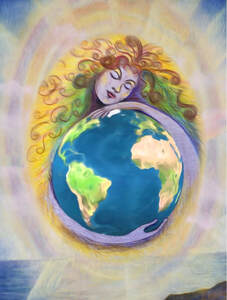
Central to it will be the universe story, recognising this great universe of ours, including our planet, as a self-organising system which has its own wisdom and laws from which we have evolved and whose future we now hold within our hands. In the light of climate change and the loss of biodiversity can we humans change our attitude from seeing the resources of our planet as infinite and there for our comfort to recognising our interdependence with all living things and that our future and way of life is intimately bound up with its future. It’s only with this change of perspective will we come to love the world we inhabit and act in ways that will sustain its life.
The idea of the universe as a single self-regulating system was developed by James Lovelock, a scientist and inventor who died on 26th July this year, on his 103rd birthday. It was his friend, the author William Golding who suggested using the metaphor Gaia for this hypothesis as a more imaginative way of describing it. In Greek mythology Gaia is the goddess of the earth and mother of all life and thinking of the universe in this more personal way helps us to see it as a living organism which regulates its environment to create the best conditions for the advancement of life. It is to recognise that there is no distinct, separate identity for all are interrelated and depend on one another for life. So, we breathe in the oxygen expelled by trees who breathe in the carbon dioxide expelled by us. We need one another for survival. But so often human beings seem to forget this and the statistics for the destruction of rain forests that are the lungs of our planet are frightening. Surely Gaia must weep over the control some of us humans exert on the natural world and long for us to recover our rightful place in it so that we might work together for its well being and advancement. The welfare of our planet is in our hands.
The Gaia theory was ridiculed when James Lovelock first proposed it but it is now recognised by many as the foundation of much of climate science and movements such as The Work that Reconnects, established by Joanna Macey and the Deep Transformation Network set up by Jeremy Lent as well as centres like An Tairseach. To link into these is to feel part of a movement which recognises the dire critical state of our planet but gives hope and a motivation for action. There are many people out there reflecting on our connectedness and interrelatedness with nature and trying to steer us away from greed, desire, and the belief that the resources of nature are inexhaustible and there for our benefit and comfort.
I was privileged to be able to link into a conversation organised by the Deep Transformation Network between Ursula Goodenough and Andreas Weber. Both of them are lovers of life and nature, who see reality as oriented towards and yearning to give life. To be alive said Weber is to generate life and this desire comes from the inside of nature not from without. Individual subjects are driven by something within which craves for more existence, something the theologian Karl Rahner called ‘supernatural existentialism’ but related it to a christian understanding of salvation. Life itself is a miracle and, I suspect for Weber, needs no Creator who planned and set the whole process in motion – something I have some sympathy for. This is not to reject a religious perspective, but it is to reinterpret it in the light of what we now know of the universe story – something that will be well reflected on during this week’s retreat. It is also to recognise that we humans must listen to that drive towards life and respond accordingly for, says Weber, “humans will be run over in the search for life” but what will bring about our salvation is love which he describes as “the impulse to establish connections, to intermingle, to weave our existence poetically together with that of other beings. The fact that we disregard this principle lies at the core of a global crisis of meaning that plays out in the avalanche of species loss and in our belief that the world is a dead mechanism controlled through economic efficiency”.
What better foundation for a retreat could there be than this.


 RSS Feed
RSS Feed
